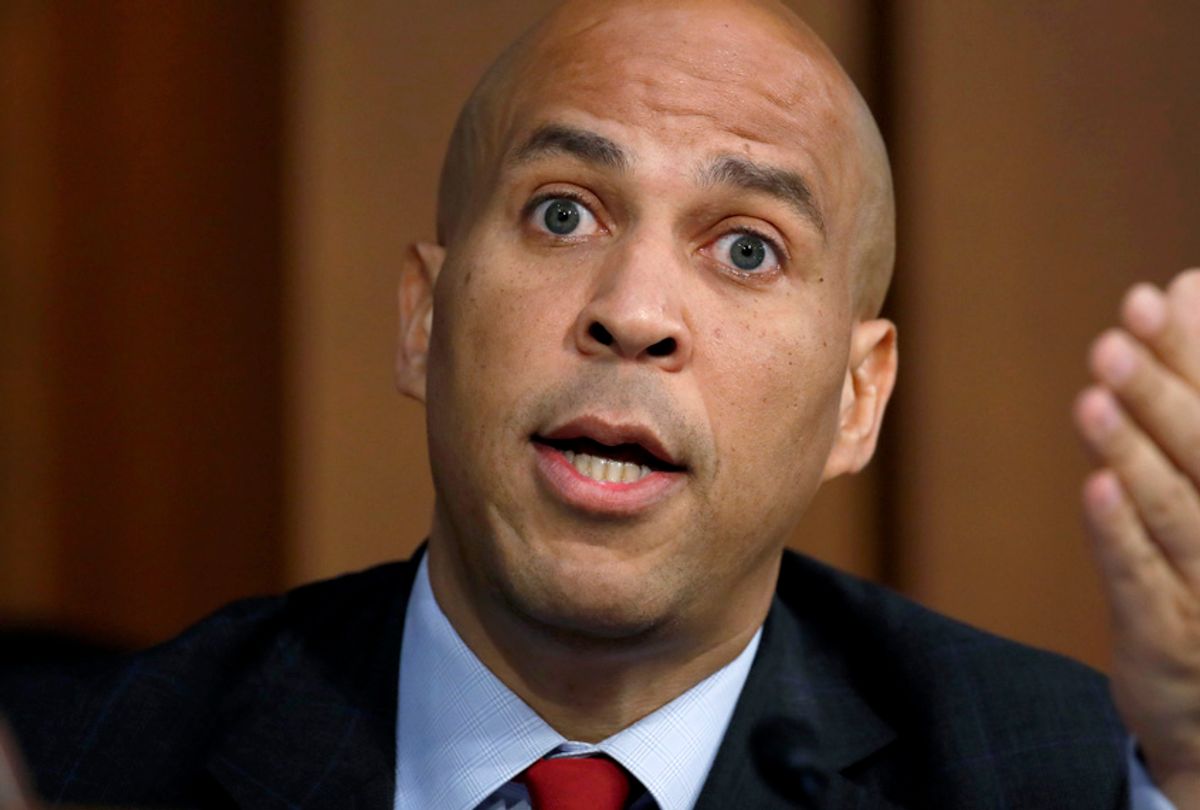Sen. Cory Booker, D-N.J., released emails written by Supreme Court nominee Brett Kavanaugh that had been deemed "committee confidential" by Judiciary Committee Republicans, technically risking his expulsion from the Senate.
Before Booker published the documents, Sen. John Cornyn, R-Texas, referenced a relevant Senate rule and reminded Booker that he could lose his seat for violating it. The New Jersey Democrat replied immediately: "Bring it," and released the emails.
"Sen. Cornyn made a very good point. I knowingly violated the rules that were put forth," Booker said at the Senate hearing Thursday morning. "I come from a long line, as all of us do as Americans, of understanding what that kind of civil disobedience is, and I understand the consequences."
"So I am, right now, before your process is finished, I am going to release the email about racial profiling," he continued. "And I understand that the penalty comes with potential ousting from the Senate. And if Sen. Cornyn believes that I have violated Senate rules, I openly invite and accept the consequences of my team releasing that email right now."
While Booker said he would "knowingly violate" the rules and accept the consequences, he argued that the emails, which date back to Kavanaugh's time as a lawyer in George W. Bush's White House, should be made public because they do not jeopardize national security or expose any personal information. The emails do, however, address some of Kavanaugh's views on racial profiling and racial discrimination, which Booker believes should be on the record
In one email that Booker released, Kavanaugh expressed criticism of the Department of Transportation's affirmative action regulations. "The fundamental problem in this case is that these DOT regulations use a lot of legalisms and disguises to mask what is a naked racial set-aside," he wrote, adding that he felt confident, however, that the Supreme Court’s four conservative justices at the time "will realize as much in short order and rule accordingly."
"Running for president is no excuse for violating the rules of the Senate or of the confidentiality of the documents that we are privy to," Cornyn responded to Booker. (Rumors of Booker's potential 2020 presidential run loom large.) "No senator deserves to sit on this committee — or serve in the Senate, in my view — if they decide to be a law unto themselves and willingly flout the rules of the Senate and the determination of confidentiality and classification," Cornyn added. "That is irresponsible and conduct unbecoming a senator."
The GOP's Twitter account also focused on the career ambitions of both Booker and Sen. Kamala Harris, D-Calif., who grilled Kavanaugh on Wednesday about a possible connection to the Robert Mueller investigation, positioning their aspirations as reason for their actions.
Once Booker promised to release the confidential documents, however, other Democrats rallied in support. Sen. Mazie Hirono, D-Hawaii, also published the emails, saying during the hearing that she was willing to "defy anyone." And Sen. Dick Durbin, D-Ill., said he would take similar action and accept the punishment. "Let's jump into this pit together," he said. "Count me in."
To be clear, it is highly unlikely that Booker or any other senator will be expelled from the body. Such an extreme action hasn't occurred since the Civil War, when some Southern senators were expelled for actual treason. However, Booker and others could potentially face other forms of punishment that are less severe.
Following the tense exchange, White House principal deputy press secretary Raj Shah tweeted out the rule, which Cornyn referenced in the hearing.
Racial profiling wasn't the only controversial topic raised in these documents. In March 2003, Kavanaugh reportedly wrote an email that was provided to the New York Times by an anonymous source, that questioned whether the landmark abortion rights decision, Roe v. Wade, was "settled law of the land."
"I am not sure that all legal scholars refer to Roe as the settled law of the land at the Supreme Court level since Court can always overrule its precedent, and three current Justices on the Court would do so," Kavanaugh wrote at the time.
The email appears to contradict Kavanaugh's statements during the hearings this week, when he said that the abortion rights secured by the 1973 Roe v. Wade decision are "an important precedent of the Supreme Court that has been reaffirmed many times."
Sen. Richard Blumenthal, D-Conn., had already asked Kavanaugh about this apparent contradiction stance on Wednesday, but did not reference the confidential documents as evidence.

Shares